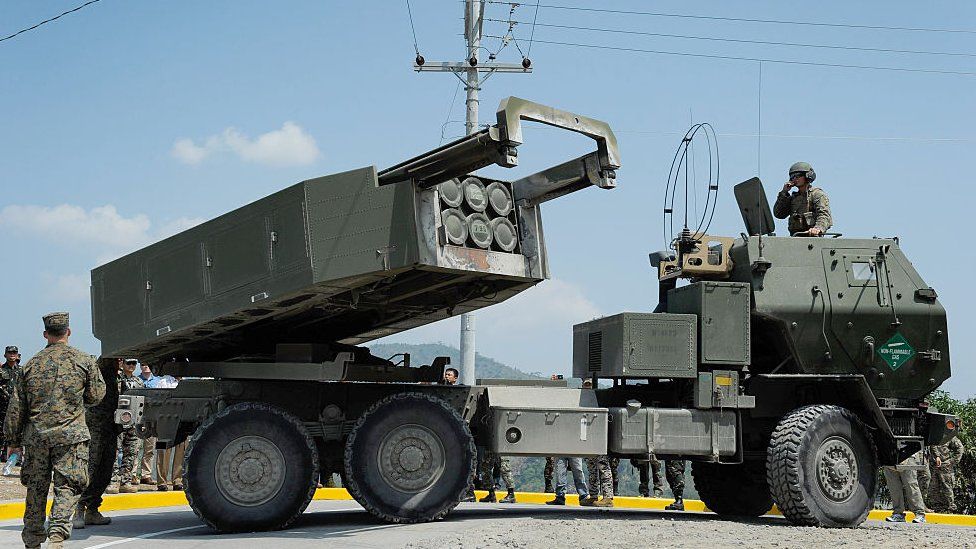The US will send Ukraine more advanced rocket systems to help it defend itself, President Biden has announced.
The weapons, long requested by Ukraine, are to help it strike enemy forces more precisely from a longer distance.
Until now, the US had refused the request out of fear the weapons could be used against targets in Russia.
But on Wednesday, Mr Biden said the lethal aid would strengthen Kyiv's negotiating position against Russia and make a diplomatic solution more likely.
Writing in the New York Times, he said: "That is why I've decided that we will provide the Ukrainians with more advanced rocket systems and munitions that will enable them to more precisely strike key targets on the battlefield in Ukraine."
This is a fine balancing act for Mr Biden, as providing more powerful weapons could risk drawing the US and its Nato allies into direct conflict with Russia.
New weaponry will include the M142 High Mobility Artillery Rocket System (HIMARS), a senior White House official said - although he did not specify how many of them would be supplied.
The systems can launch multiple precision-guided missiles at targets as far as 70km (45 miles) away - far further than the artillery that Ukraine currently has. They are also believed to be more accurate than their Russian equivalents.
Last month, Ukraine's army chief said that getting the HIMARS units would be "crucial" in allowing it to counter Russian missile attacks.
The US expects Ukraine to deploy the weapons in the eastern Donbas region, where the fighting is most intense, and where they can be used to strike Russian artillery units and forces targeting Ukrainian towns.
White House officials agreed to provide the rockets, they said, only after gaining assurances from President Volodomyr Zelensky that the weapons would not be used to attack targets inside Russia.
"We are not going to send to Ukraine rocket systems that can strike into Russia," Mr Biden wrote on Wednesday.
Mr Zelensky confirmed this in an interview for US network Newsmax.
"We're not interested in what is happening in Russia," he said. "We're only interested in our own territory in Ukraine."
The latest rockets will be the centrepiece of a $700m (£556m) support package for Ukraine that will be formally unveiled on Wednesday, White House officials said.
Helicopters, anti-tank weapons, tactical vehicles and spare parts are to be included in what will be the 11th package of military aid approved by the US for Ukraine since the invasion began in February.
In Wednesday's article, Mr Biden wrote that the US's goal was simply to see a "democratic, independent, sovereign" Ukraine, not to oust Mr Putin from his role as Russian president or to seek broader conflict with Moscow.
He blamed Russia's continued aggression for the stalling of peace efforts, adding that the US would never put pressure on Ukraine to concede any of its territory in return for an end to the conflict.
Directly addressing the risk of nuclear weapons being used in Ukraine, Mr Biden said "we currently see no indication" of this being Russia's intention - but warned that doing so would be unacceptable and bring with it "severe consequences".
Soon after Mr Biden's piece was published, Russian military officials announced that the country's nuclear forces were holding drills in Ivanovo province near Moscow, Interfax news agency reported.
Previously Russian Foreign Minister Sergei Lavrov has accused the West of "pumping up the Ukrainian nationalists with weapons" and said that any cargo of arms bound for Ukraine would become a legitimate target for Moscow.
The ministry has said that Nato countries are "playing with fire" by sending weapons to Ukraine.
Meanwhile in Ukraine, fighting is continuing in the eastern Donbas region.
On Tuesday, the governor of Luhansk said that one of Ukraine's last holdouts in the region - the eastern city of Severodonetsk - was now mostly under Moscow's control.
Russian forces now occupy almost all of Luhansk and are focusing on seizing neighbouring Donetsk, the two regions which collectively make up Donbas.
BBC





